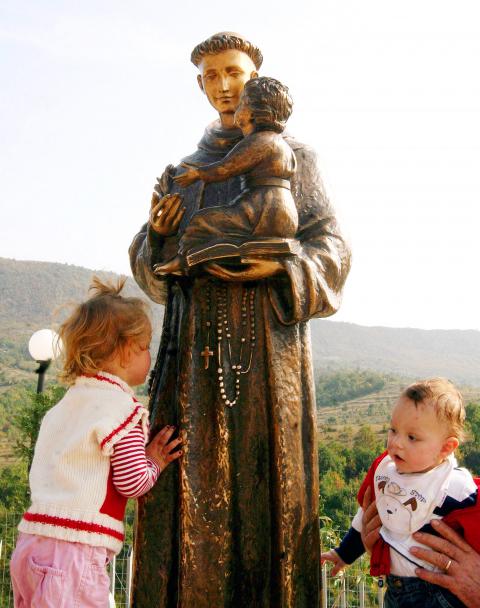On an Albanian spring day, dozens of Muslims, Catholics and Orthodox Christians toil together up a steep, winding slope to St Anthony’s Church — different faiths all hoping for a miracle.
Some of the pilgrims heading up the stony path to the imposing church are barefoot and wedge their feet into cracks in rocks believed to have powers, including protection against disease.
Others collect five white stones along the way and, in accordance with tradition, whisper to each before placing it back on the ground.

Photo: AFP
Ilir, a young Orthodox Christian engineer, rubs his wallet on a rock, hoping for prosperity. “I have come to pray to God for my prayers to be granted this year,” he says.
Catholic mother-of-two Mir is praying St Antony will save her marriage.
“I have problems with my husband,” the young lawyer says.
“I come to ask God to give me a son this year,” says Servete, a Muslim who has traveled to Lac, about 50km north of the capital Tirana, from Durres further west.
On their slow march up the hill, the pilgrims pass a cave where legend says St Antony slept; some leave clothing belonging to their children or sick loved ones needing a cure.
The popular weekly pilgrimage is testament to the survival in Albania of a strong religious faith despite efforts of the 1945 to 1990 communist dictatorship to mercilessly root it out.
Repression and international isolation under the militantly atheistic regime, which banned all forms of religious expression, has today forged an original mix of faith, superstition, folklore and tolerance.
The majority of Albania’s population of almost 3 million is Muslim, but there are strong Orthodox and Catholic minorities too.
The different faiths tend to worship at the same places and people sometimes switch religions for convenience, which might shock some in less tolerant societies.
Here, God is the “same for the Catholics, the Orthodox and the Muslims,” anthropologist Aferdita Onuzi says. “All believe in a miracle that could change their life.”
With the communist dictatorship banning all religious practices in the country, sociologist Artan Fuga says: “Believers who could not practice their faith freely went to look for the divine where they could find it ... also using sacred places or objects from animist and pagan beliefs.”
In an example, thousands of Albanians of all faiths come together each August on Tomorri mountain in the south of the country to honor both a pagan sun cult and the religious practices of an Islamic Sufi order, the Bektashi.
“Common attendance by Muslims and Christians to the places of worship is a widespread phenomenon in Albania,” says Besnik Mustafaj of the non-governmental Forum of Alliance of Civilizations.
Many Albanians “during their eventful history, switched from one religion to another, because of economic necessities or more simply for practical questions,” says Lira Caushi, professor at Tirana’s university.
Albania was Christian when it was conquered by the Ottoman Empire in the 15th century and many of its people converted to Islam in order to get jobs in the Ottoman administration.
In an example that persists today, Albanians who want to emigrate to neighboring Greece, an EU member, try to change their identity to prove they belong to Albania’s Greek minority and in the process convert to Orthodox Christianity.
Marriages between Muslims and Christians are frequent and many Albanians are at loss to say which religion they practice.

Yemen’s separatist leader has vowed to keep working for an independent state in the country’s south, in his first social media post since he disappeared earlier this month after his group briefly seized swathes of territory. Aidarous al-Zubaidi’s United Arab Emirates (UAE)-backed Southern Transitional Council (STC) forces last month captured two Yemeni provinces in an offensive that was rolled back by Saudi strikes and Riyadh’s allied forces on the ground. Al-Zubaidi then disappeared after he failed to board a flight to Riyadh for talks earlier this month, with Saudi Arabia accusing him of fleeing to Abu Dhabi, while supporters insisted he was

The Chinese Embassy in Manila yesterday said it has filed a diplomatic protest against a Philippine Coast Guard spokesman over a social media post that included cartoonish images of Chinese President Xi Jinping (習近平). Philippine Coast Guard spokesman Jay Tarriela and an embassy official had been trading barbs since last week over issues concerning the disputed South China Sea. The crucial waterway, which Beijing claims historic rights to despite an international ruling that its assertion has no legal basis, has been the site of repeated clashes between Chinese and Philippine vessels. Tarriela’s Facebook post on Wednesday included a photo of him giving a

‘MOBILIZED’: While protesters countered ICE agents, Minnesota Governor Tim Walz activated the state’s National Guard to ‘support the rights of Minnesotans’ to assemble Hundreds of counterprotesters drowned out a far-right activist’s attempt to hold a small rally in support of US President Donald Trump’s latest immigration crackdown in Minneapolis, Minnesota, on Saturday, as the governor’s office announced that National Guard troops were mobilized and ready to assist law enforcement, although not yet deployed to city streets. There have been protests every day since the US Department of Homeland Security (DHS) ramped up immigration enforcement in the Twin Cities of Minneapolis and Saint Paul by bringing in more than 2,000 federal officers. Conservative influencer Jake Lang organized an anti-Islam, anti-Somali and pro-US Immigration and Customs Enforcement

NASA on Saturday rolled out its towering Space Launch System (SLS) rocket and Orion spacecraft as it began preparations for its first crewed mission to the Moon in more than 50 years. The maneuver, which takes up to 12 hours, would allow the US space agency to begin a string of tests for the Artemis 2 mission, which could blast off as early as Feb. 6. The immense orange and white SLS rocket, and the Orion vessel were slowly wheeled out of the Vehicle Assembly Building at the Kennedy Space Center in Florida, and painstakingly moved 6.5km to Launch Pad 39B. If the